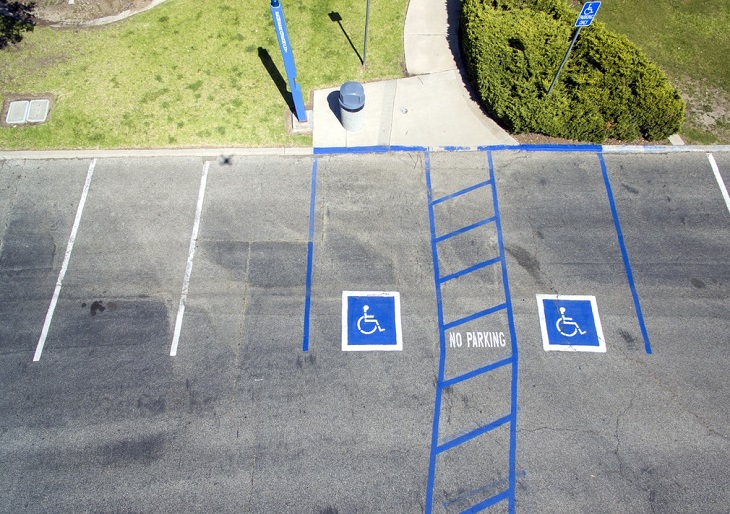Are Police Allowed To Park In Handicap Spots?

One complaint that many users of disabled parking permits have is that sometimes people who aren’t entitled to use the spots use them anyway – even the police. Far too often, people assume that using a handicap parking spot because they’re in a hurry is OK, but what they don’t understand is how this impacts people who really need to using those spots.
So who can legally use handicap spots? What are the rules surrounding their use? Are police allowed to park in handicap spots? All of these questions and more are answered below – keep reading to learn all you need to know about handicap parking use and, in some cases, abuse.
Who Are Handicap Parking Spots For?
You see them almost everywhere: blue-and-white signs with the international symbol of access that denotes a parking space for someone with a handicap parking permit. Most people understand that these spaces are only for those people who possess the valid parking permit issued by the state in which they live. Still, it’s not uncommon to see someone taking the space even if they don’t possess the appropriate tag or license plate to do so.
Handicap parking spots are meant for drivers or passengers with conditions and disabilities that make it difficult to get around. These spaces help them to get more easily where they need to go and reduce stress.
If you do not possess a proper handicap license plate or a parking permit, it is illegal to park in a handicap space. Penalties for doing so will vary from place to place, but it almost certainly involves some form of a fine, which can get expensive fast.

Are Police Allowed To Park In Handicap Spots?
Police are given a lot of latitudes when it comes to parking and driving in general, but the rules of handicap parking spots still apply to police cars. In an emergency, police are allowed to park in handicap spots and zones. However, police who are not responding to an emergency still must abide by the rules surrounding handicap parking spots, and are not allowed to park there when simply running errands or stopping for something not related to an emergency.
What Can You Do If Someone Is Parked In a Handicap Spot Illegally?
When you are disabled with a handicap parking permit or plate, not being able to find parking can be stressful. While you may not be able to make a space magically appear, you can ensure those who are parking in handicap spaces illegally are reprimanded.
To report a car that is parked illegally in a handicap spot, you should:
- Gather information. Make sure the car doesn’t have a handicap plate or placard first. Not all disabilities are visible, and this is very important to keep in mind if you see someone exiting a car in a handicap spot who doesn’t look as if they have a disability. If you do determine the car is parked illegally, take down the license plate number and, in the case of someone abusing a parking placard, the number on the placard.
- Call the non-emergency line. There is a non-emergency line for the police in your area, and that is the number you should use to report this incident.
- Visit the police department. You can also physically go to a police department to make the report during normal business hours. You will provide a statement of the details and present any other evidence you have.
- File a report online. In some places, you can file a report online to the local police or sheriff’s department. Check your local authorities’ website to see if that’s an option for you.
Hopefully, police will then take action to punish the person who is abusing the parking situation. In many places, fines of up to $1,000 can be incurred for these violations, and may even include being charged with a misdemeanor that can result in jail time.

Etiquette for Handicap Parking
When you do use a handicap parking permit or plate, make sure you’re aware of the standards of etiquette expected when using them, such as:
- Awareness of different handicap spots. There aren’t laws that specifically outline what type of handicap spot you should use, but be aware of the limitations of the accessibility of others, even if it doesn’t apply to you. For example, you shouldn’t park in a spot designated for a van if you aren’t driving an accessible van or require a ramp to exit your vehicle. Try to use the space that is most appropriate for your individual needs.
- Display your permit correctly. In most states, you will be required to display a handicap parking permit clearly and visibly when parking. This may mean it is hung from the rearview mirror or placed face-up on the dashboard of the vehicle.
- Access aisles should be open. Do not park in the cross-hatched access aisles beside disabled parking spots. They are there to give those in wheelchairs easier access to their vehicles.
Featured image by Matt Popovich on Unsplash